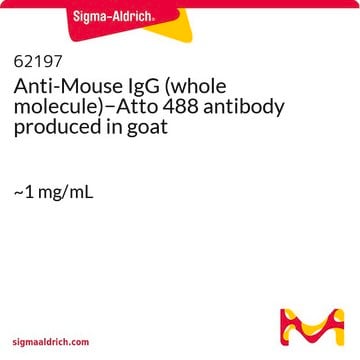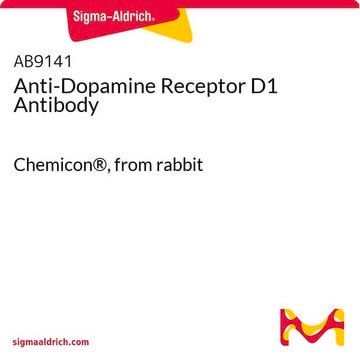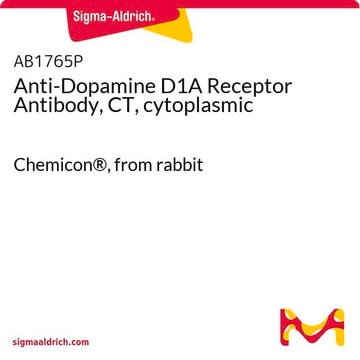ABE250
Anti-dimethyl Histone H3 (Lys4) Antibody
from rabbit, purified by affinity chromatography
Synonyme(s) :
H3 histone family, member T, histone 3, H3, histone cluster 3, H3, H3K4me2
About This Item
Produits recommandés
Source biologique
rabbit
Niveau de qualité
Forme d'anticorps
affinity isolated antibody
Type de produit anticorps
primary antibodies
Clone
polyclonal
Produit purifié par
affinity chromatography
Espèces réactives
mouse, rat, human, chicken
Technique(s)
ChIP: suitable (ChIP-seq)
dot blot: suitable
immunocytochemistry: suitable
western blot: suitable
Numéro d'accès NCBI
Numéro d'accès UniProt
Conditions d'expédition
wet ice
Modification post-traductionnelle de la cible
dimethylation (Lys4)
Informations sur le gène
human ... HIST1H3F(8968)
Description générale
Spécificité
Immunogène
Application
1:500 dilution from a representative lot detected Histone H3 in NIH/3T3 and A431 cells.
Dot Blot Analysis:
1:1,000 dilution from a representative lot specifically detected Histone H3 in a Lys4 dimethhyl modified histone H3 peptide while not detecting potential cross-reacting peptides corresponding to other modified and non-modified histones.
Chromatin Immunoprecipitation Analysis:
Sonicated chromatin prepared from HeLa cells (1 X 10E6 cell equivalents per IP) were subjected to chromatin immunoprecipitation using 4 µg of either Normal IgG (Part No. 12-370), or 4 µL of Anti-Dimethyl Histone H3 (Lys4) (Part No. ABE250) and the Magna ChIP A/G Kit (Cat. # 17-10085). Successful immunoprecipitation of Dimethyl-Histone H3 (Lys4) associated DNA fragments was verified by qPCR using primers specific for the human GAPDH coding region.
Please refer to the EZ-Magna ChIP A/G (Cat. # 17-10085) protocol for experimental details.
ChIP-Sequencing
Chromatin immunoprecipitation was performed using the Magna ChIP HiSens kit (cat# 17-10460), 5 µg ofa representative lot of anti-dimethyl-Histone H3 (Lys4) antibody(ABE250), 20 µL Protein A/G beads ,and 5e6 crosslinked HeLa cell chromatin followed by DNA purification using magnetic beads. Libraries were prepared from Input and ChIP DNA samples using standard protocols with Illumina barcoded adapters, and analyzed on Illumina HiSeq instrument. An excess of twelve million reads from FastQ files were mapped using Bowtie (http://bowtie-bio.sourceforge.net/manual.shtml) following TagDust (http://genome.gsc.riken.jp/osc/english/dataresource/) tag removal. Peaks were identified using MACS (http://luelab.dfci.harvard.edu/MACS/), with peaks and reads visualized as a custom track in UCSC Genome Browser (http://genome.ucsc.edu) from BigWig and BED files.
Epigenetics & Nuclear Function
Histones
Qualité
Western Blot Analysis: 1:1,000 dilution of this antibody detected Histone H3 on 10 µg of HeLa acid extract.
Description de la cible
Liaison
Forme physique
Stockage et stabilité
Remarque sur l'analyse
HeLa acid extract
Clause de non-responsabilité
Vous ne trouvez pas le bon produit ?
Essayez notre Outil de sélection de produits.
Code de la classe de stockage
12 - Non Combustible Liquids
Classe de danger pour l'eau (WGK)
WGK 1
Point d'éclair (°F)
Not applicable
Point d'éclair (°C)
Not applicable
Certificats d'analyse (COA)
Recherchez un Certificats d'analyse (COA) en saisissant le numéro de lot du produit. Les numéros de lot figurent sur l'étiquette du produit après les mots "Lot" ou "Batch".
Déjà en possession de ce produit ?
Retrouvez la documentation relative aux produits que vous avez récemment achetés dans la Bibliothèque de documents.
Notre équipe de scientifiques dispose d'une expérience dans tous les secteurs de la recherche, notamment en sciences de la vie, science des matériaux, synthèse chimique, chromatographie, analyse et dans de nombreux autres domaines..
Contacter notre Service technique








